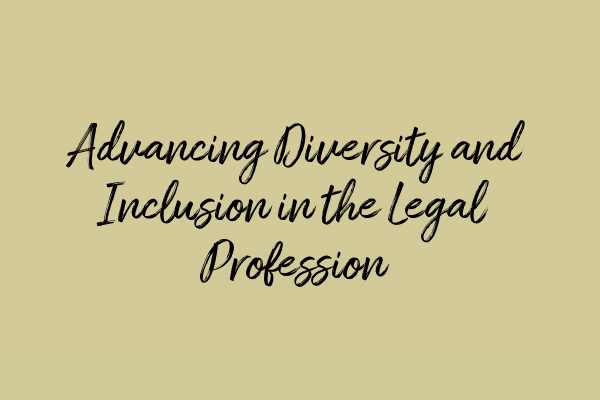Advancing Diversity and Inclusion in the Legal Profession
In recent years, there has been an increasing emphasis on advancing diversity and inclusion in various industries, and the legal profession is no exception. Diversity encompasses differences in race, ethnicity, gender, sexual orientation, disability, socio-economic background, and more. Inclusion, on the other hand, refers to creating an environment where individuals from diverse backgrounds feel valued, respected, and able to contribute to their maximum potential. The legal profession has recognized the importance of embracing diversity and inclusion to foster a more equitable and just legal system. In this article, we will explore the significance of diversity and inclusion in the legal profession and discuss various initiatives and strategies aimed at advancing these principles.
The Benefits of Diversity and Inclusion
Diversity and inclusion are not just buzzwords; they bring tangible benefits to the legal profession. Firstly, diverse legal teams promote a broader range of perspectives and ideas, leading to more creative and innovative problem-solving. Different backgrounds and experiences contribute to a richer understanding of complex legal issues, ensuring a well-rounded approach to legal practice.
Secondly, diversity and inclusion help foster a more equitable and representative legal system. By ensuring that legal professionals reflect the diversity of the communities they serve, trust and confidence in the legal system are strengthened. This, in turn, promotes access to justice and enhances the quality of legal services provided.
Promoting Diversity and Inclusion in the Legal Profession
Several initiatives and strategies have been developed to promote diversity and inclusion in the legal profession. One such initiative is the implementation of diversity targets and quotas. Law firms and legal organizations set specific goals for increasing representation of underrepresented groups within their ranks. These targets serve as a tangible measure of progress and hold organizations accountable for their commitment to diversity and inclusion.
Another strategy is the creation of affinity groups and networks within the legal profession. These groups provide a platform for individuals with shared backgrounds or identities to connect, support each other, and advocate for change. By fostering a sense of community and belonging, these groups contribute to a more inclusive legal profession.
Furthermore, mentorship and sponsorship programs play a crucial role in advancing diversity and inclusion. By pairing individuals from underrepresented groups with experienced professionals, these programs provide guidance, support, and opportunities for career advancement. Mentors and sponsors help bridge the opportunity gap that may exist for diverse individuals and empower them to excel in their legal careers.
Challenges and Solutions
While progress has been made in advancing diversity and inclusion in the legal profession, challenges still exist. One of the challenges is unconscious bias, which can result in discriminatory practices during recruitment, promotion, and decision-making processes. To address this, organizations should implement training programs to raise awareness about unconscious bias and provide tools for mitigating its impact.
Another challenge is the lack of diversity in leadership positions within the legal profession. Organizations need to actively work towards creating pathways for diverse individuals to reach leadership roles. This can be achieved through targeted development programs, sponsorship initiatives, and inclusive leadership practices.
Conclusion
Advancing diversity and inclusion in the legal profession is not only the right thing to do but also essential for the effectiveness and fairness of the legal system. By embracing diversity and creating inclusive environments, the legal profession can better serve its diverse client base and ensure equal access to justice. Through initiatives such as diversity targets, affinity groups, mentorship programs, and addressing unconscious bias, progress can be achieved in creating a more diverse and inclusive legal profession. Let us continue working together towards a legal system that truly reflects the diverse society in which we live.
Related Articles:
- SQE Prep: Tips and Tricks to Excel in Criminal Law
- Cross-Examination Techniques: Mastering the Art of Questioning
- Private Prosecutions: Exploring Non-Governmental Prosecutions in Criminal Cases
- Ethical Challenges in Criminal Defence: Navigating Dilemmas
- Assault and Battery Laws: Understanding the Legal Parameters


Leave a Reply